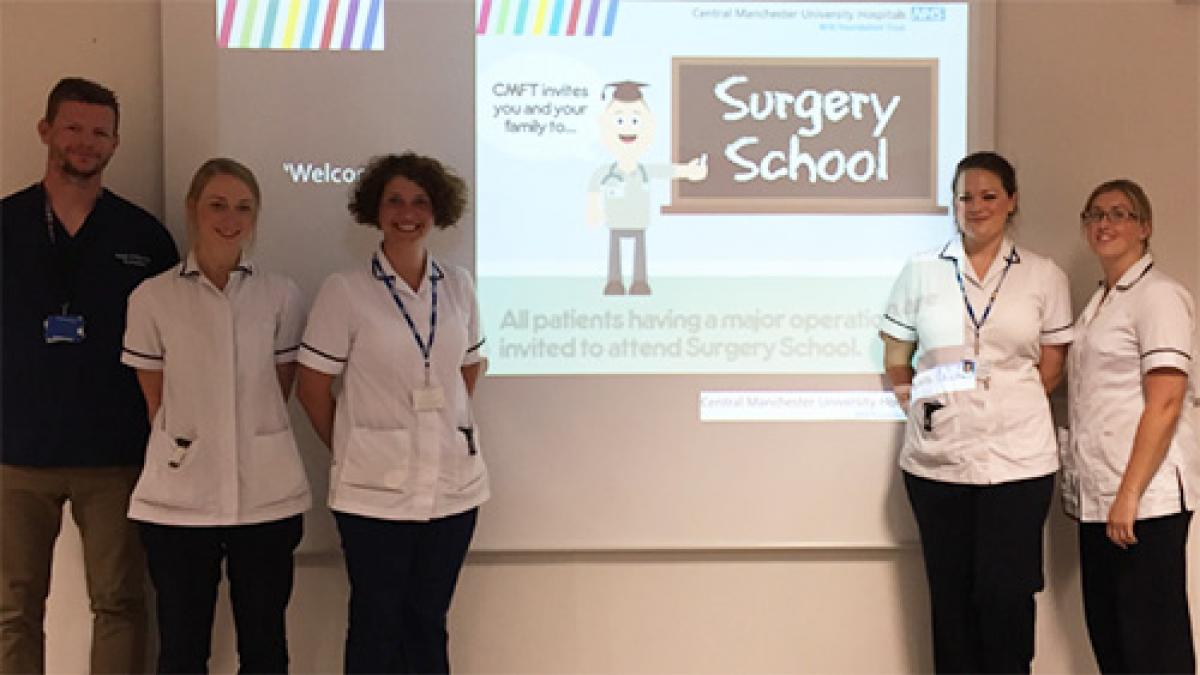A pre-operative patient education programme involving physios has approximately halved the rate of post-operative pulmonary complications in patients undergoing major elective surgery.

Left to right: Dr John Moore (consultant in anaesthetics and critical care), Siobhan Wilde (specialist physiotherapist), Nikki McGill (surgery team lead physiotherapist), Lisa Kerigan (specialist physiotherapist) and Elizabeth Evans (senior specialist physiotherapist)
Known as ERAS+, the multidisciplinary patient education programme was introduced at Central Manchester University Hospitals NHS Trust in September 2014. It followed an audit during the previous year.
This showed almost 20% of patients undergoing planned elective major surgery with a planned critical care admission developed post-operative pulmonary complications.
As a result, the existing patient education programme was revised. Additional measures to reduce the potential for post-operative pulmonary complications, such as pneumonia, were introduced.
Patients were given advice on early mobilisation, what to expect from surgery, as well as the use of incentive spirometers pre-operatively to encourage deep breathing techniques in preparation for post-op recovery. Patients were also encouraged to get themselves fit for surgery.
Surgery school
Typically, the advice was delivered during one-hour ‘surgery school’ sessions held from four to six weeks before surgery. These were run by doctors, senior nurses and physiotherapists from the critical care and surgery team.
‘The idea is to empower patients before and after surgery,’ said Lisa Kerigan, a specialist physio in critical care and surgery. ‘And the programme is producing statistically significant results.’
A re-audit of post-operative complications with this group of patients conducted from January to April 2015 found that the rate had dropped to 10.4 per cent. By January this year, however, it had fallen to just eight per cent.
‘This shows there has been a sustained reduction in post-operative pulmonary complications since we introduced improved patient education programme,’ Ms Kerigan said.
‘There also appears to have been a reduction in length of stays, although data on this is currently being collated.’
She added that a similar programme is planned for the general surgery wards.
This article was amended on 8 June 2016. The headline had wrongly stated that the ERAS+ programme had halved admissions to critical care, when in fact it has reduced the rate of post-operative pulmonary complications in elective major surgical patients. The article also wrongly stated that ERAS+ was a 'post-operative' programme, when it is in fact pre-operative.
The article was further amended on 9 June 2016 to take into account changes made by interviewee in the third paragraph. This article was further amended on 17 June 2016 to replace the sentence stating 'as well as the use of spirometers to measure pre-op chest health' with 'as well as the use of incentive spirometers pre-operatively to encourage deep breathing techniques in preparation for post-op recovery.'
Number of subscribers: 0